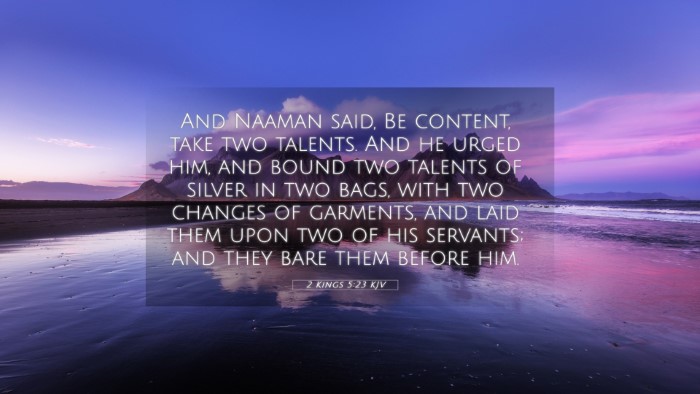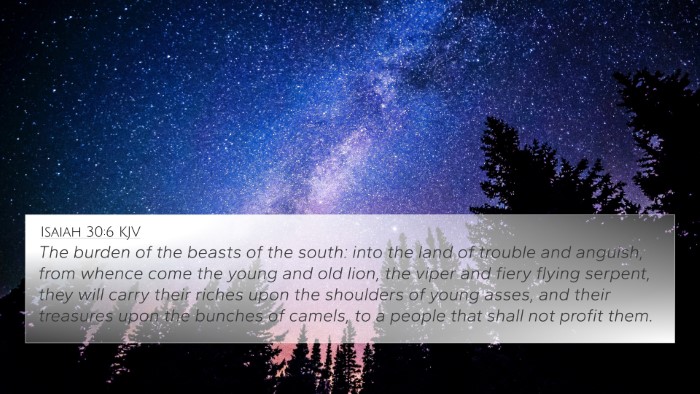Understanding 2 Kings 5:23
Verse: 2 Kings 5:23 – "And Naaman said, Be content, take two talents. And he urged him, and bound two talents of silver in two bags, with two changes of garments, and laid them upon two of his servants; and they bare them before him."
Verse Meaning Summary
The passage of 2 Kings 5:23 centers around Naaman, a Syrian commander who sought healing from Elisha, the prophet of Israel. After his miraculous healing from leprosy, Naaman expressed gratitude and an eagerness to reward Elisha for his services. This verse reflects not just Naaman's physical healing, but also his transformation from a seeker of power to a humble servant, indicating a shift in his understanding of wealth, service, and worship.
Insights from Commentaries
Matthew Henry’s Commentary
Matthew Henry highlights Naaman's urgency and willingness to give gifts as a sign of his gratitude. However, he also underlines the potential folly in believing that one can "buy" the favor of God or a prophet with material goods. This illustrates a fundamental lesson of grace — that spiritual blessings cannot be merited through monetary exchange. Henry emphasizes the significance of Naaman’s actions showing a transformation; Naaman, having received healing beyond material wealth, wishes to acknowledge this through his offerings.
Albert Barnes' Notes on the Bible
Barnes notes that Naaman's offer reflects a deep cultural understanding of how respect and honor function in ancient Near Eastern societies. To offer gifts is to establish a relationship of gratitude and reciprocity. He stresses that while Naaman was zealous in his intention to express thanks, he was misguided in not understanding that Elisha’s service was motivated by divine power rather than personal gain. Barnes points out the implications of this transaction in terms of faith and spiritual acknowledgment; that genuine gratitude must stem from a heart transformed by God’s grace.
Adam Clarke’s Commentary
Adam Clarke adds another dimension to the interpretation by focusing on the two talents of silver Naaman offers. He posits that this not only indicates Naaman's wealth but also the amount was symbolic, representing a portion of the healing he received. Clarke elaborates on the act of giving and the human tendency to want to reciprocate kindness and mercy with tangible rewards. He highlights the nuanced understanding of giving in the Biblical context — that while gifts may signify gratitude, they should not overshadow the need for heartfelt appreciation to God.
Cross-References of 2 Kings 5:23
- 2 Kings 4:42-44 - Elisha's provision of food illustrates God's miraculous power and the importance of sharing blessings.
- Matthew 10:8 - "Freely you have received; freely give," which aligns with the concept of grace in serving.
- Acts 8:18-20 - The story of Simon Magus, who sought to buy the Holy Spirit, exemplifies the futility of trying to purchase spiritual gifts.
- 1 Samuel 9:7 - Saul's wealth and offerings present a theme of honor in giving and the cultural implications.
- 1 Peter 5:2 - Encouragement for leaders to steward resources not out of obligation but willingly, which resonates with Naaman's willingness to give.
- Luke 17:15-16 - The leper that returns to thank Jesus highlights gratitude as an essential response to healing.
- Proverbs 3:9 - "Honor the Lord with your wealth," reflecting the foundational truth of good stewardship of what we receive.
Thematic Connections
The story of Naaman serves as a powerful narrative in exploring themes of faith, grace, and the nature of divine mercy. It invites readers to reflect on how one expresses gratitude for blessings received and the heart's capacity to acknowledge God's grace towards us. This extends across both the Old and New Testaments, linking various themes through key scriptural cross-references.
Conclusion
2 Kings 5:23 not only emphasizes Naaman's desire to repay Elisha but also opens up extensive dialogue within the Scriptures regarding the nature of giving, gratitude, and the response to divine favor. Searching for connections between Bible verses such as this one can deepen understanding and illuminate the broader narrative of faith across biblical texts.









